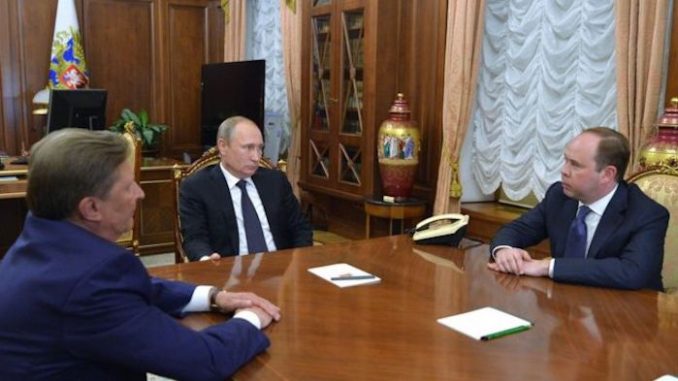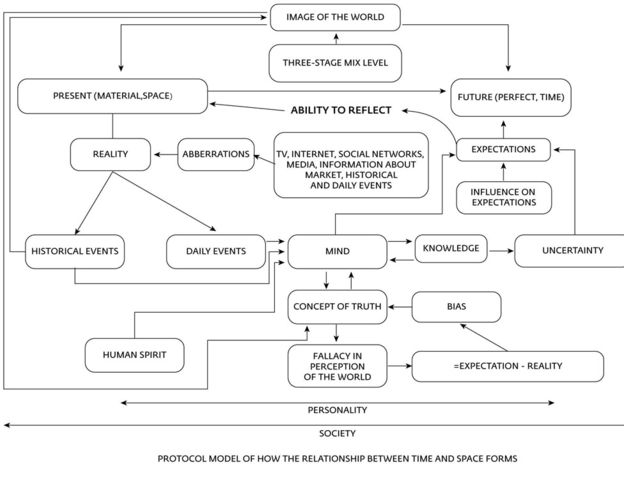
Vladimir Putin’s new chief of staff, Anton Vaino, has unveiled a new device he claims is able to tap into the global consciousness.
An investigation by the BBC found that Mr. Vaino invented a mysterious device for the Russian government – enabling them to “better understand and control society.”
BBC News reports: In 2012 an article appeared in a specialist journal called Economics and Law written by an “AE Vaino” – widely believed to be one and the same person as Mr Putin’s new chief of staff.
It was titled “The capitalisation of the future”.
Levers of power
Written in a dense academic prose – which many Russian commentators this week said they found almost impossible to understand – and accompanied by even more complex charts and diagrams, the article outlines new ways of organising and understanding society.

Mr Vaino argues that the economy and society in general have become too complex to manage by traditional means. Governments need to seek new ways of regulating and controlling them.
The article describes a new device called a “nooscope” which, it says, can tap into global consciousness and “detect and register changes in the biosphere and in human activity”.
The “nooscope” bewildered many in Russia this week. Does the device really exist, they asked. What does it actually do? Is Mr Vaino really serious?
BBC Russian tracked down Viktor Sarayev, an award-winning economist and businessman who has co-authored a number of articles with Mr Vaino.
He described the nooscope as “a device that scans transactions between people, things and money”, and claimed it was an invention of parallel significance to the telescope and the microscope.
But he was less forthcoming about whether it actually existed, or was still under development.
‘Utopian idea’
Leading Russian academics meanwhile expressed deep scepticism about the theories and solutions propounded by Mr Vaino and his collaborators.
“There isn’t any science in this,” says Simon Kordonsky, a philosophy professor at Moscow’s Higher School of Economics.
He dismissed the article as indulging in “mythological” hypotheses about the future which, he said, contrasted with the genuinely progressive ideas explored by the first generation of Russian reforming economists in the early post-Soviet years.
“If we evaluate this article by its meaning, then without doubt it’s a cause for concern,” says another philosopher from the same institute, Prof Vitaly Kourennoy.
“It represents a utopian idea which has no connection to science. It’s propounding some kind of all-embracing system of government that has to be enforced by top officials.”
Viewed from this perspective however, Mr Vaino’s theories perhaps begin to make more sense.
They could actually be seen as part of a pattern that has emerged in Russian politics over the past decade, as President Putin has sought to reassert control after the chaos of the early 1990s.
Kremlin spin doctors
Some observers also draw parallels with the approach of one of Mr Vaino’s predecessors – former presidential adviser and deputy prime minister Vladislav Surkov.
Dubbed by one Russian politician as “a puppet master who privatised the political system”, Mr Surkov is credited with inventing the theory of “managed democracy”, through which President Putin now runs Russia unchallenged.
Widely seen as a master of political spin, Mr Surkov specialised in manipulating information in a way which often left his interlocutors unsure as to where the facts ended and the fiction began.
This also appears to be an approach used by Dmitry Kiselyov, the powerful head of the state-run Russia Today media network, and a man often referred to as “the Kremlin’s chief propagandist”.
Tasked with broadcasting the Kremlin’s point of view, both to Russians and the rest of the world, Mr Kiselyov told the BBC earlier this year that “the age of neutral journalism” had passed.
Blurred reality
In expounding his theories about the “nooscope” Anton Vaino seems to be echoing these more high-profile Kremlin colleagues.
There is no way to prove that the world “exists in reality and not in our imagination”, he writes in the Economics and Law article, explaining why the nooscope is needed to interpret and manage world events.
Prof Kordonsky feels he has heard it all before.
“It’s a state of mind,” he told BBC Russian. “It’s a rejection of the current realities. They want to change things but they don’t want to understand what things are really like. They have a perception of potential greatness […] and they’re suggesting a way of changing the country and building a better tomorrow.”
If AE Vaino the political scientist and Anton Vaino the new chief of staff really are the same person, as most Russians presume, then the coming months may show if the nooscope can really deliver a “better tomorrow”.
Source Article from http://yournewswire.com/putin-chief-staff-device-global-consciousness/
Related posts:
Views: 0
 RSS Feed
RSS Feed

















 January 15th, 2018
January 15th, 2018  Awake Goy
Awake Goy 
 Posted in
Posted in  Tags:
Tags: 
















